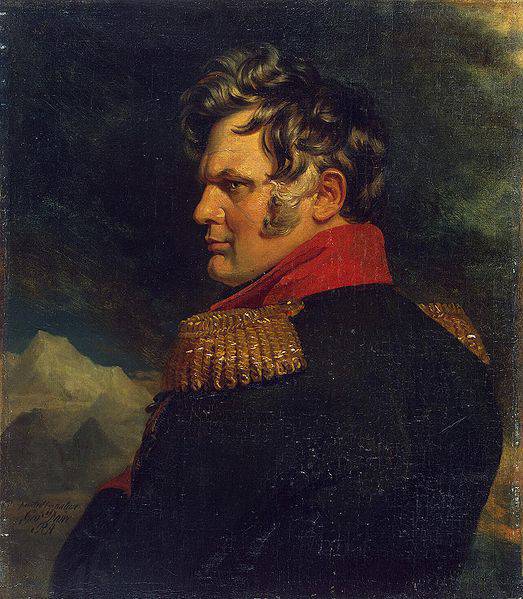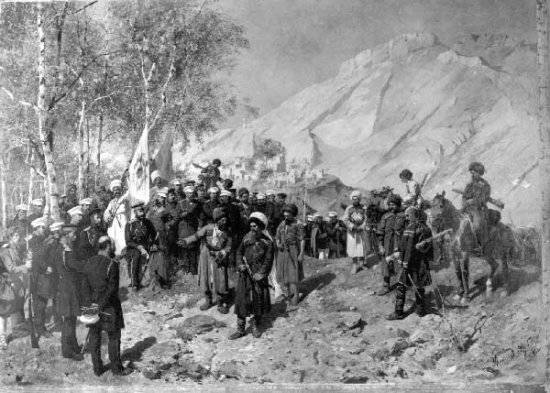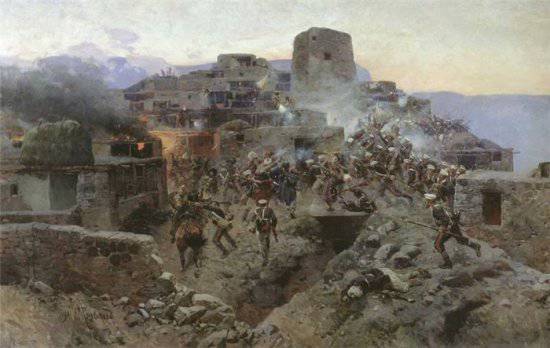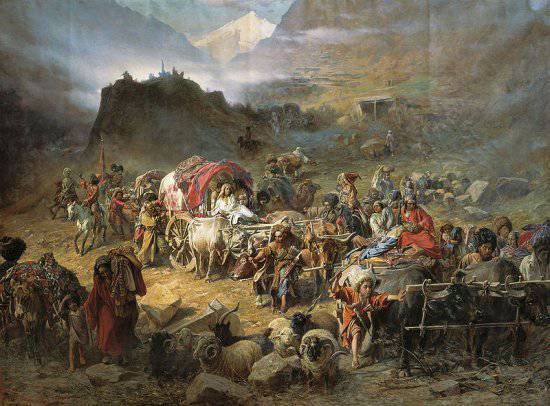General Yermolov knew how to pacify the abreks

By the spring of 1818, the headquarters of General Yermolov, Proconsul of the Caucasus (then Khloponin) was littered with reports of the bloody atrocities perpetrated by Chechens in the Cossack lands. The scale of the raids became more and more threatening, the deputy Yermolov even ordered to remove all the posts in Terek, because of their uselessness and the danger of being cut out themselves. The situation was deplorable, the inhabitants of the villages were afraid to go out of the gate, they moved between the villages accompanied by a military crossing, once a day and then only after a preliminary inspection of the road. Chechens attacked suddenly from wolf ambushes, massacred, cattle, grabbed women and children, destroyed and burned villages and villages. This state of affairs required certain decisions and actions, and they were not long in coming.
Yermolov decided to act harshly, he understood that the so-called “peaceful Chechens” who live in the nearest near-Territory auls are the main suppliers of information about the movements of Russian troops. It was in these “peaceful” auls that the robbers organized their bases, prepared for raids and brought the loot and prisoners to the camp.
Having reported upstairs on the state of affairs and perpetrated bloody attacks, having approved his plan of "appeasement" with Emperor Alexander I, the proconsul proceeded to action. Tough demands were made on the inhabitants of the villages, in particular in appeals to the Chechens it was said: “In the case of theft, the auls are obliged to extradite the thief. If the thief is hidden, then give his family. If the villagers give an opportunity to the family of the criminal to escape, then they are obliged to extradite his closest relatives. If relatives are not given out - your villages will be destroyed and burned, families are sold to the mountains, prisoners are hanged. ” Also, the proconsul summoned the elders of the villages and told them that if at least one detachment of bandit beasts was passed through their lands, the entire population of their villages would be driven into the mountains, where they would be destroyed by plague and famine, all taken prisoner would be hanged: “Better from Terek to Sunzha, I will leave the scorched, desert steppes, rather than in the rear of the Russian fortifications, I will suffer looting and robberies. Choose any - submission or terrible extermination, ”the general told them in conclusion.
Further, following the planned plan, the troops were forwarded to the Terek and 10 on June 1818, the six-bastion citadel was solemnly laid, receiving the telling name of Grozny.
The next goal of the Yermolovsky plan of pacification was to clear the territory adjacent to the Terek from a hostile population. Knowing the mentality of the local, the proconsul understood that peaceful evacuation would not work, this can only be achieved by forcibly "an example of horror." For a demonstrative punitive action, the aul Dady-Yurt, a gangster den of all the neighboring Abreks, was chosen.
15 September 1819, at dawn, Russian troops under the command of ataman, General Sysoev, were stationed near Dady-Yurt. Ataman detachment consisted of 5-ti Kabardian infantry companies, a company of the Trinity Regiment, 700 Cossacks and five guns. An ultimatum was presented to the inhabitants of the village, it was proposed to voluntarily leave the village and leave for Sunzha.
But the inhabitants, having considered the ultimatum as an empty threat, rejected him and prepared for the defense of the village. A desperate, bloody battle began, one of the first fierce battles of Russian troops in the Caucasus.
Each yard in the village was surrounded by a stone fence, which had to be shot from guns, dragging guns in their hands to each house under heavy fire of Chechens who were shooting almost point-blank. Fighters rushed into the gaps made by cannons and a brutal and bloody hand-to-hand fight began. The soldiers had nowhere to retreat, the Chechens fought for their families. Desperate bitterness grew with every second of the bloody battle, but the pressure of the Russian army could not be stopped. Chechens, realizing that they did not defend the village, in the eyes of the attackers, slaughtered their wives and children and rushed into battle. Losses from both sides grew rapidly, dismounted Cossacks entered the battle. The assault on the village lasted several hours and ended only after the complete extermination of all the defenders of the village.
Of the living inhabitants of Dady-Yurt, only 140 women and children remained, and several seriously injured men. The aul was burned down and completely destroyed by artillery fire. The total losses of the Russian troops were a quarter of their original strength, and General Sysoev himself was wounded.
The destruction of Dady-Yurt made the residents of the remaining villages send their families to the mountains. And the next village of Isti-Soo was taken by Russian troops in just thirty minutes, without much resistance in a bayonet attack. Only in the aul mosque there was a fierce clash with a group of religious fanatics who refused to surrender, they were all killed in a bayonet battle. Then, without any problems, the villages of Nain-Berdy and Allayar-aul were taken, but the next aul of Hosh-Geldy met Yermolov with bread and salt and was forgiven. The remaining villages were abandoned by the locals. Robberies and looting temporarily stopped.
Such a cruel attitude of the Russian proconsul to the Chechen auls caused an explosion of rage and the spread of muridism throughout the North Caucasus. But one should understand that such actions of Yermolov were based not on the barbarous attitude to the Chechens, but on the bitter experience of the negotiation processes, the coaxing of the highlanders, who never led to constructive results. Although this practice of bloody sweeps did not give significant results in establishing good neighborly relations.
After the resignation of Proconsul Yermolov, his successors tested many more techniques, methods and means for establishing peace in the Caucasus. But not even supporters of the Yermolov methods had to contact them again and again, using the legacy of a general to pacify the wild highlanders.
- http://topwar.ru"rel =" nofollow ">http://topwar.ru



Information